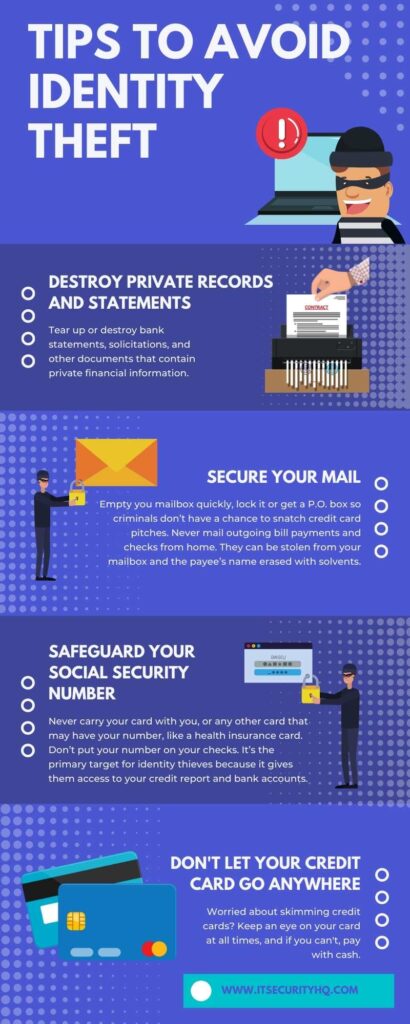Identity theft is a serious problem that affects millions of people every year. With the increasing use of technology, it has become easier than ever for criminals to steal your personal information and use it to their advantage. From credit card fraud to identity fraud, the consequences of identity theft can be devastating. In this article, we will explore what identity theft is, how it happens, and most importantly, what you can do to protect yourself.
What is Identity Theft?
Identity theft is when someone steals your personal information and uses it to commit fraud. This can include things like opening credit accounts in your name, using your existing credit accounts, and even filing a tax return under your name. Identity theft can happen in a variety of ways, including:
- Phishing Scams: Phishing scams are a type of cyber attack where attackers use fraudulent emails, text messages, or websites to trick individuals into providing sensitive information such as login credentials, credit card information, or social security numbers. These scams can be difficult to detect, as they often appear to be legitimate and can be very convincing. To avoid falling victim to phishing scams, individuals should be cautious about clicking on links or downloading attachments from unfamiliar sources, and should verify the legitimacy of emails or websites before providing any personal information.
- Skimming: Skimming is a type of fraud where attackers use a small device called a skimmer to steal credit or debit card information when a card is swiped at a payment terminal. Skimming devices can be installed on ATMs, gas pumps, or other payment terminals, and are often difficult to detect. To avoid falling victim to skimming, individuals should be cautious when using payment terminals in public places, and should look for any signs of tampering or unusual devices attached to the terminal.
- Data Breaches: Data breaches occur when a company’s database or computer system is compromised, resulting in the theft of sensitive information such as login credentials, credit card information, or social security numbers. Data breaches can be caused by a variety of factors, including malware, hacking, or employee error. To protect themselves from data breaches, individuals should use unique passwords for each of their online accounts, monitor their credit report for any unauthorized activity, and be cautious about providing personal information to online sources.
- Dumpster Diving: Dumpster diving is a type of physical attack where attackers search through someone’s trash in order to find sensitive information such as credit card statements, bank statements, or other documents containing personal information. To avoid falling victim to dumpster diving, individuals should shred any sensitive documents before disposing of them, and should be cautious about what they throw away.
- Mail Theft: Mail theft is a type of physical attack where attackers steal mail in order to obtain sensitive information such as credit card statements, bank statements, or other documents containing personal information. To avoid falling victim to mail theft, individuals should use a locking mailbox or have their mail delivered to a secure location.
- Social Engineering: Social engineering is a type of attack where attackers use manipulation tactics to trick individuals into divulging sensitive information or performing actions that they would not otherwise do. Social engineering can take many forms, including phone calls, emails, or even in-person interactions. To protect themselves from social engineering attacks, individuals should be cautious about providing personal information to strangers, and should verify the legitimacy of any requests for information or actions.
How to Protect Yourself from Identity Theft:
There are a number of things you can do to protect yourself from identity theft. Here are some tips and tricks:
- Use Strong Passwords: One of the easiest ways to protect yourself from identity theft is to use strong, unique passwords for all of your online accounts. Make sure that your password is at least 12 characters long and includes a mix of upper and lowercase letters, numbers, and symbols. You should also use a different password for each of your accounts.
- Monitor Your Credit Report: It is important to regularly monitor your credit report to ensure that there are no unauthorized accounts or activity. You can request a free copy of your credit report from each of the three major credit reporting agencies once a year.
- Be Careful with Your Personal Information: Be cautious about giving out your personal information, especially online. Only provide your personal information to trusted sources, and be wary of emails or phone calls asking for your personal information.
- Secure Your Devices: Make sure that your computer, smartphone, and other devices are secure. This includes installing antivirus software, keeping your operating system and software up to date, and avoiding public Wi-Fi networks.
- Shred Sensitive Documents: When disposing of sensitive documents, make sure to shred them instead of throwing them in the trash. This includes things like bank statements, credit card offers, and other documents that contain personal information.
FAQs: Q: What should I do if I think my identity has been stolen? A: If you suspect that your identity has been stolen, you should contact your bank and credit card companies immediately. You should also place a fraud alert on your credit report and file a report with the Federal Trade Commission.
Q: Can I prevent all instances of identity theft? A: While you can’t prevent all instances of identity theft, taking proactive steps to protect yourself can greatly reduce your risk.
Q: Is it safe to use public Wi-Fi networks? A: Public Wi-Fi networks can be risky, as they are often unsecured. If you must use a public Wi-Fi network, make sure to use a virtual private network (VPN) to encrypt your data.
Recent Identity theft attacks:
- T-Mobile Data Breach: In August 2021, T-Mobile reported that they had suffered a data breach that exposed the personal information of over 50 million customers, including names, addresses, and social security numbers. The breach was caused by a cyberattack that exploited a vulnerability in T-Mobile’s computer systems.
- COVID-19 Unemployment Fraud: In 2020 and 2021, there was a surge in unemployment fraud related to COVID-19. Criminals used stolen identities to file fraudulent unemployment claims, resulting in billions of dollars in losses for states and individuals.
- SolarWinds Data Breach: In December 2020, it was revealed that the SolarWinds software had been hacked, resulting in a massive data breach that affected numerous government agencies and businesses. The breach exposed sensitive information such as email communications, source code, and other data.
- Amazon Phishing Scam: In January 2021, a phishing scam targeting Amazon customers was discovered. The scam involved fraudulent emails that appeared to be from Amazon, asking customers to update their account information. The emails contained a link to a fake website that collected customer information.
- Capital One Data Breach: In 2019, Capital One reported that they had suffered a data breach that exposed the personal information of over 100 million customers, including names, addresses, and social security numbers. The breach was caused by a misconfigured firewall, which allowed a hacker to gain access to the company’s computer systems.
Physical Items:
Not all identity theft is digital and there are some phyiscal precautions that also need to be taken. Here are some key physical precautions you can take to protect your identity:

The takeaway:
Identity theft is a serious problem, but there are steps you can take to protect yourself. By using strong passwords, monitoring your credit report, being careful with your personal information, securing your devices, and shredding sensitive documents, you can greatly reduce your risk of becoming a victim of identity theft. Stay vigilant and take action if you suspect that your identity has been stolen.

